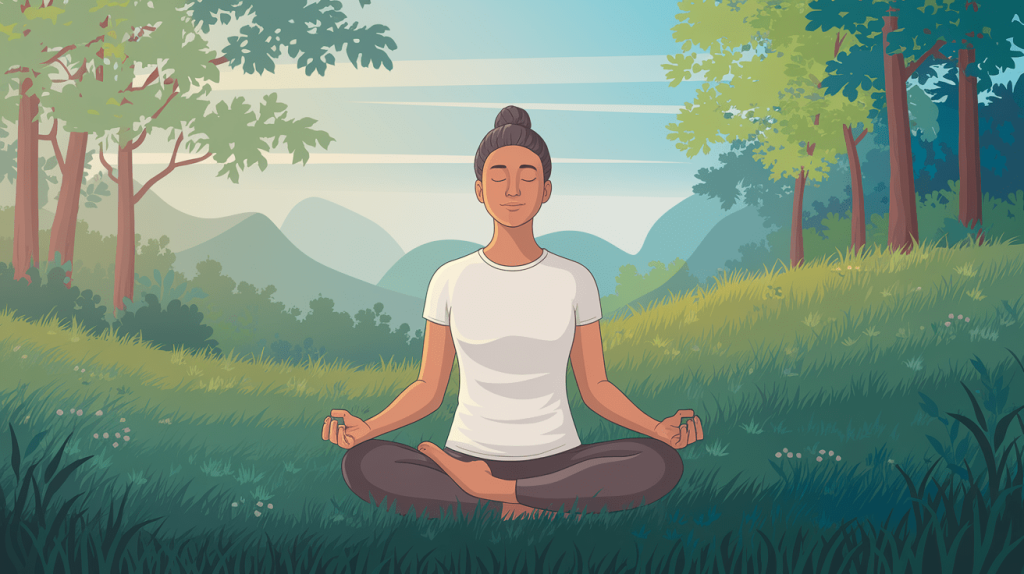Mindfulness plays a crucial role in personal development by fostering mental and emotional growth. Understanding what mindfulness is and incorporating it into your daily routine can set you on the right path. Some simple techniques include mindful breathing, body scans, and maintaining a gratitude journal. The benefits are vast, ranging from reduced stress and anxiety to improved focus and emotional well-being. To measure mindfulness’s impact on your personal growth, consider keeping a journal of your experiences and progress. By integrating mindfulness into your routine, you can significantly enhance your personal development journey.
Understanding Mindfulness: The First Step In Personal Development
Mindfulness has become a buzzword in recent years, but its roots extend deep into ancient traditions. Understanding this concept is crucial as it serves as the foundational element in one’s journey of *personal development*. At its core, mindfulness is the practice of being present and fully engaged with whatever we’re doing at the moment, free from distraction or judgment, and being aware of our thoughts and feelings without getting lost in them.
Those who embark on *personal development* journeys often find that mindfulness is the first and perhaps the most pivotal step. When you are mindful, you are more aware of your habits, emotional triggers, and mental processes, which allows you to make informed decisions about how you want to grow. It provides a solid ground on which to build other personal growth techniques such as setting goals, reflecting on challenges, and celebrating achievements.
*Mindfulness* goes beyond mere awareness; it’s also about acceptance. By accepting our current state without trying to change it immediately, we gain valuable insights into our behaviors and thought patterns. This can lead to profound shifts in our emotional and mental well-being. Many individuals discover that when they practice mindfulness, they are better equipped to handle stress, manage their emotions, and cultivate a more positive outlook on life. Consequently, this not only enhances mental clarity but also promotes emotional stability, making it a cornerstone of effective *personal development*.
“Mindfulness means being awake. It means knowing what you are doing.” – Jon Kabat-Zinn
Apart from introspective benefits, mindfulness also has practical implications for our daily lives. For instance, developing *mindfulness* can lead to improved focus and concentration, better decision-making, and even enhanced relationships, all of which are pivotal aspects of *personal development*. One can cultivate mindfulness through various techniques like meditation, conscious breathing, and even mindful eating. These practices not only ground you in the present but also amplify your capacity to grow and evolve continuously.
It’s interesting to note that modern psychology has acknowledged the benefits of mindfulness in various *personal development* programs. Many cognitive behavioral therapies, stress reduction programs, and emotional intelligence courses incorporate mindfulness practices to help individuals achieve a higher state of awareness and self-improvement. By embedding these mindfulness exercises into daily routines, individuals can measure their personal growth more effectively over time.
In summary, understanding and practicing mindfulness is indeed the first step toward successful *personal development*. It lays the groundwork for emotional resilience, mental clarity, and a positive life outlook, all of which are essential for holistic growth. Whether you are a novice or a seasoned practitioner, integrating mindfulness into your life can yield substantial benefits, making it an indispensable part of your *personal development* journey.
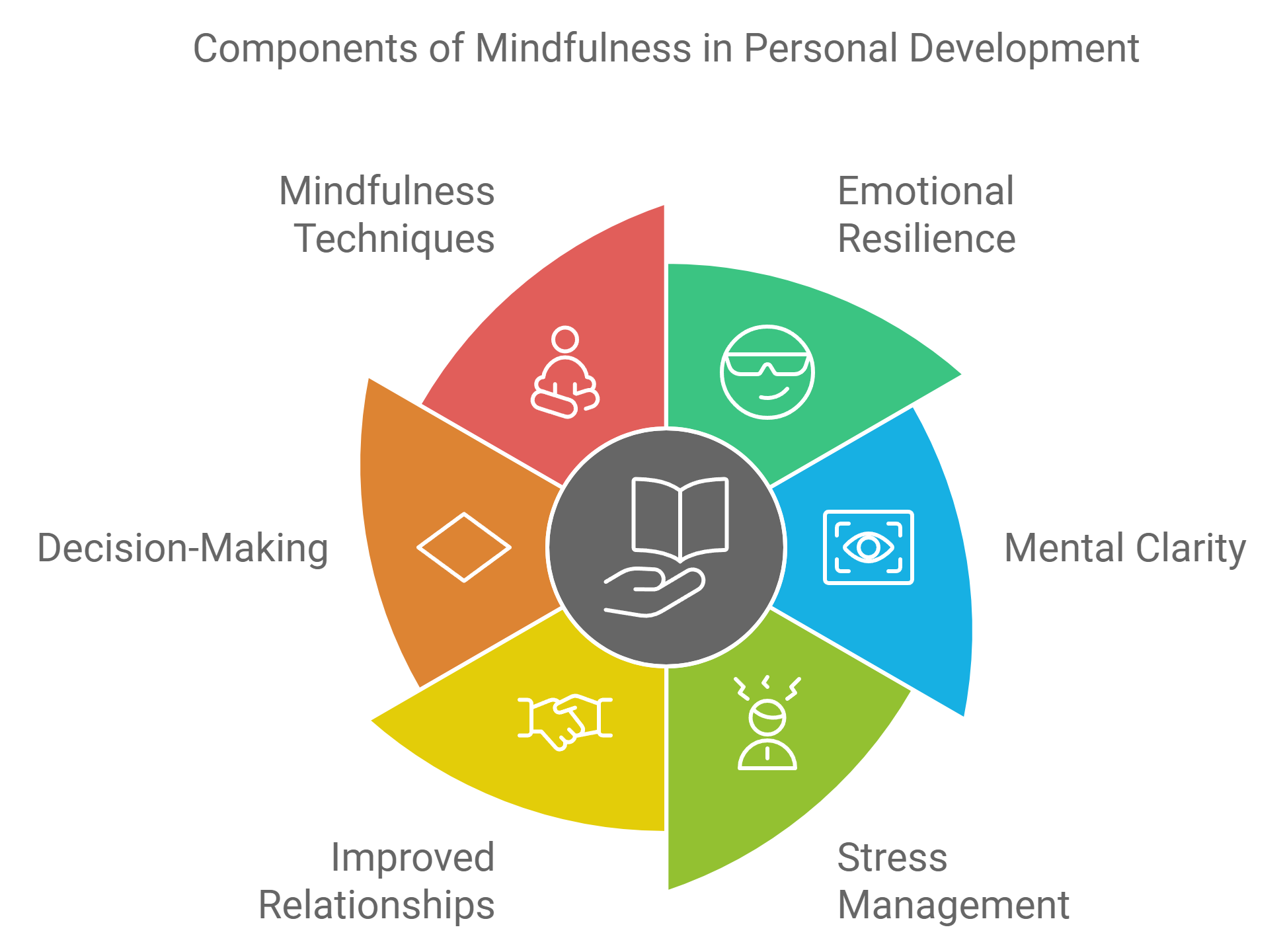
How To Incorporate Mindfulness Into Your Daily Routine
Incorporating mindfulness into your daily routine is an essential step for achieving personal development and growth. Establishing this practice can foster mental clarity, emotional stability, and a deeper understanding of one’s self. However, the key to effective and sustainable mindfulness practice is to seamlessly integrate it into your everyday activities.
One of the simplest ways to introduce mindfulness in your routine is through mindful breathing exercises. Start your day with a few minutes of deep and conscious breaths. This not only helps you center your thoughts but also prepares your mind for the challenges ahead. You may follow this with other activities such as yoga or meditation, which are wonderful methods for fostering mindfulness. Setting specific times during the day for these practices can make a significant difference in maintaining consistency.
Additionally, there are several practical techniques that can be applied during routine activities such as eating, walking, or even working. For instance, practice mindfulness while eating by savoring each bite, paying attention to the texture, taste, and aroma of the food. This can transform a mundane activity into an enriching experience. Walking mindfully by observing the surroundings, feeling the ground beneath your feet, and listening to the sounds around you can also be an excellent way to incorporate mindfulness into your daily regimen.
Another effective strategy is to create a daily mindfulness checklist. This can include tasks like mindful journaling, where you spend a few minutes reflecting on your thoughts and feelings, or mindful listening, where you give undivided attention to conversations without distractions. A checklist can help you stay accountable and ensure that you consistently practice mindfulness.
Here’s a simple checklist to get you started:
| Activity | Description |
|---|---|
| Mindful Breathing | Spend 5-10 minutes focusing on deep and calm breaths. |
| Mindful Eating | Focus on the flavors, textures, and aromas of your food without distractions. |
| Mindful Walking | Pay attention to your surroundings and the sensations in your body as you walk. |
| Mindful Journaling | Reflect on your thoughts and feelings for 10-15 minutes daily. |
Embarking on this mindfulness journey can be a transformative experience in personal development. By incorporating these practices into your daily routine, not only will you enhance your overall well-being, but you will also foster a greater sense of self-awareness and emotional resilience. As the famous quote goes, Mindfulness isn’t difficult. We just need to remember to do it. So, start incorporating mindfulness into your daily life today and witness the positive changes unfold.
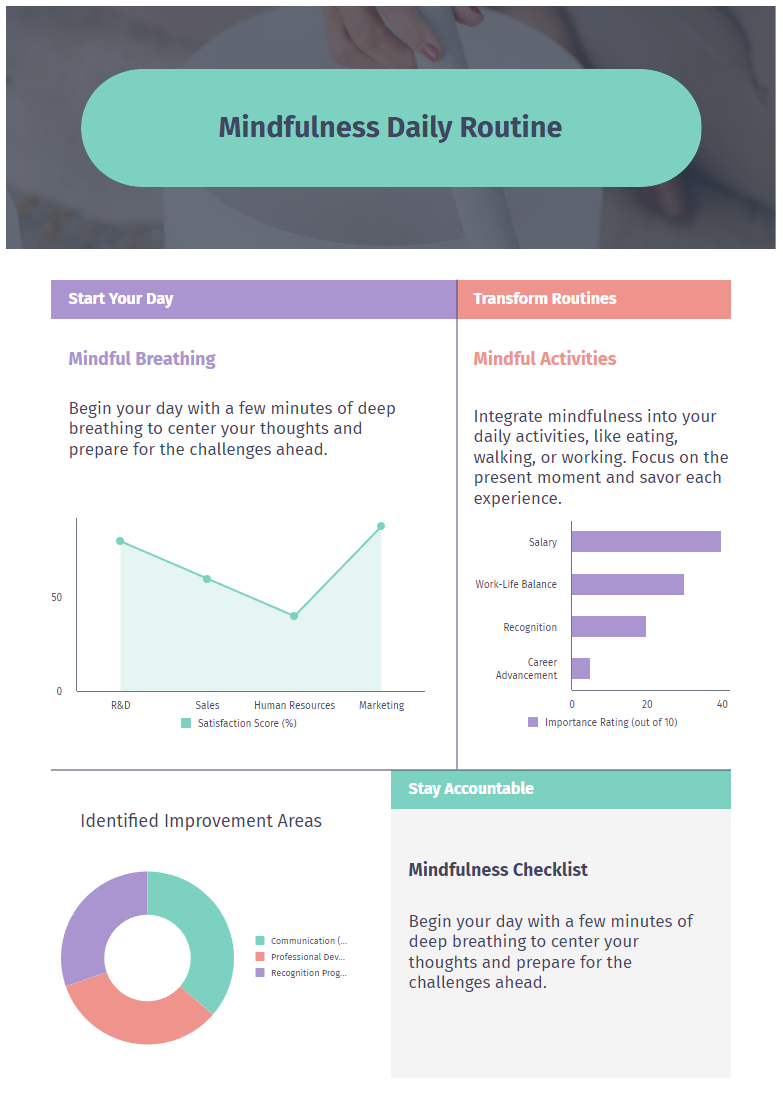
The Benefits Of Mindfulness For Mental And Emotional Growth
Mindfulness is a transformative practice that has garnered significant attention for its profound benefits on both mental and emotional well-being. When one consciously focuses on the present moment, they cultivate a state of awareness that proves crucial in mitigating stress, enhancing emotional regulation, and fostering personal development. By incorporating daily mindfulness practices, individuals can experience noticeable improvements in their overall mental health.
One of the primary benefits of mindfulness is its capability to reduce stress. When you’re mindful, you are better equipped to respond to stressful situations with a calm and measured approach. This reduces the physiological responses associated with stress, such as increased heart rate and high blood pressure. Additionally, mindfulness encourages a healthier perspective on challenges, making them seem less daunting and more manageable.
Moreover, mindfulness significantly contributes to enhancing emotional regulation. By practicing mindfulness, individuals learn to observe their emotions without immediate reaction, allowing them to process feelings in a more balanced and thoughtful manner. This ability to self-regulate can lead to improved relationships, increased empathy, and greater emotional resilience, all of which are essential for personal development. Conclusively, adopting mindfulness techniques in your daily routine can catalyze a journey of personal growth, providing long-term benefits for both mental and emotional well-being.
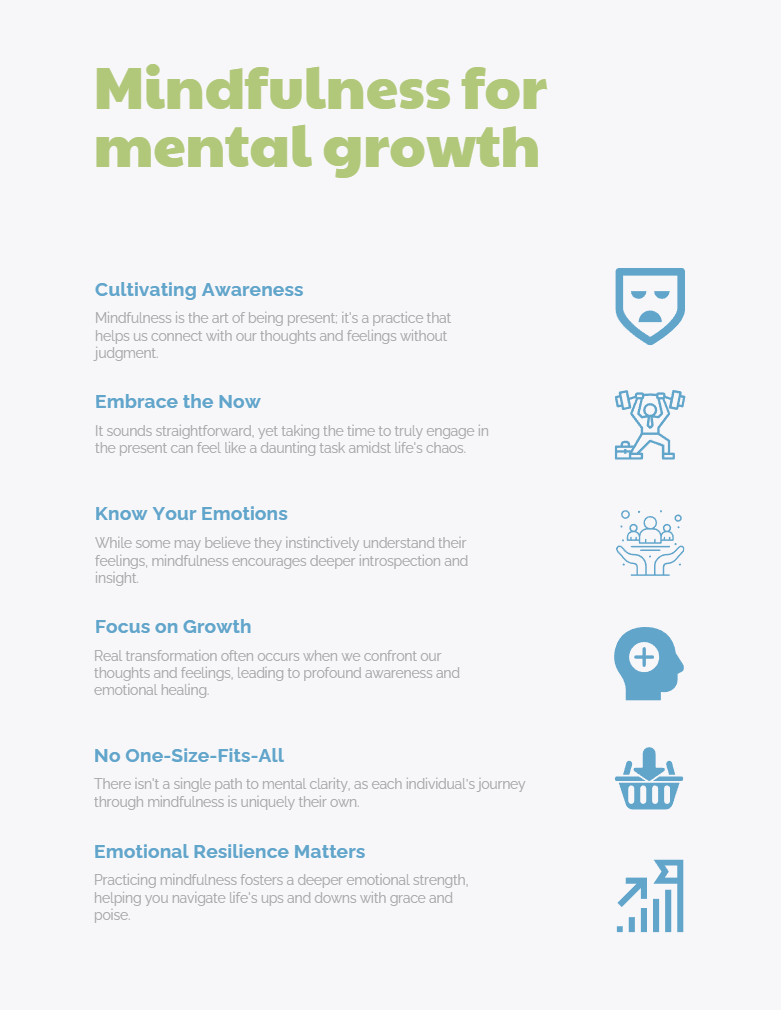
Practical Mindfulness Techniques For Personal Development
The journey of personal development requires not just dedication and effort but also the right techniques to foster growth. One of the most effective ways to enhance your personal development is through mindfulness. The practice of mindfulness allows individuals to be present, remain grounded, and respond to life’s challenges with greater clarity and calmness. By incorporating various mindfulness techniques into your daily routine, you can significantly impact your mental and emotional growth, creating a solid foundation for your personal development journey.
Meditation is one of the most well-known mindfulness techniques and involves dedicating a few minutes each day to sit quietly and focus on your breath. Simple yet powerful, this practice helps you become more aware of your thoughts, reducing stress and enhancing your ability to cope with everyday challenges. Begin with just five minutes a day and gradually increase the duration as you become more comfortable with the practice.
Another essential method is mindful breathing. This technique can be practiced anywhere and at any time. Take a few moments to consciously breathe in through your nose, hold for a few seconds, and breathe out through your mouth, focusing on the sensation of the breath. This simple act can help you reduce anxiety, lower blood pressure, and improve focus, making it an invaluable tool for personal development.
In addition to meditation and mindful breathing, incorporating mindful listening into your daily routine can enhance your relationships and communication skills. When engaging in conversations, practice active listening by giving your full attention to the speaker, acknowledging their words, and responding thoughtfully. This not only strengthens your relationships but also fosters a deeper understanding and empathy, crucial aspects of personal development.
Furthermore, practicing mindfulness in daily activities such as eating, walking, or even cleaning can lead to significant improvements in your overall well-being. Paying close attention to the sensations, smells, sounds, and textures of these activities can transform mundane tasks into opportunities for mindfulness practice. By doing so, you cultivate a more profound appreciation for the present moment, which is essential for personal development.
Incorporating mindfulness into your daily routine does not have to be overwhelming. Here’s a simple list to help you get started:
- Start your day with a 5-minute meditation session.
- Practice mindful breathing during breaks at work or school.
- Engage in mindful listening during conversations with friends and family.
- Be present and attentive while performing daily tasks.
By consistently applying these mindfulness techniques, you can track substantial progress in your personal development journey. Remember, mindfulness is not about perfection but about cultivating a state of awareness and presence that supports continuous growth and improvement.
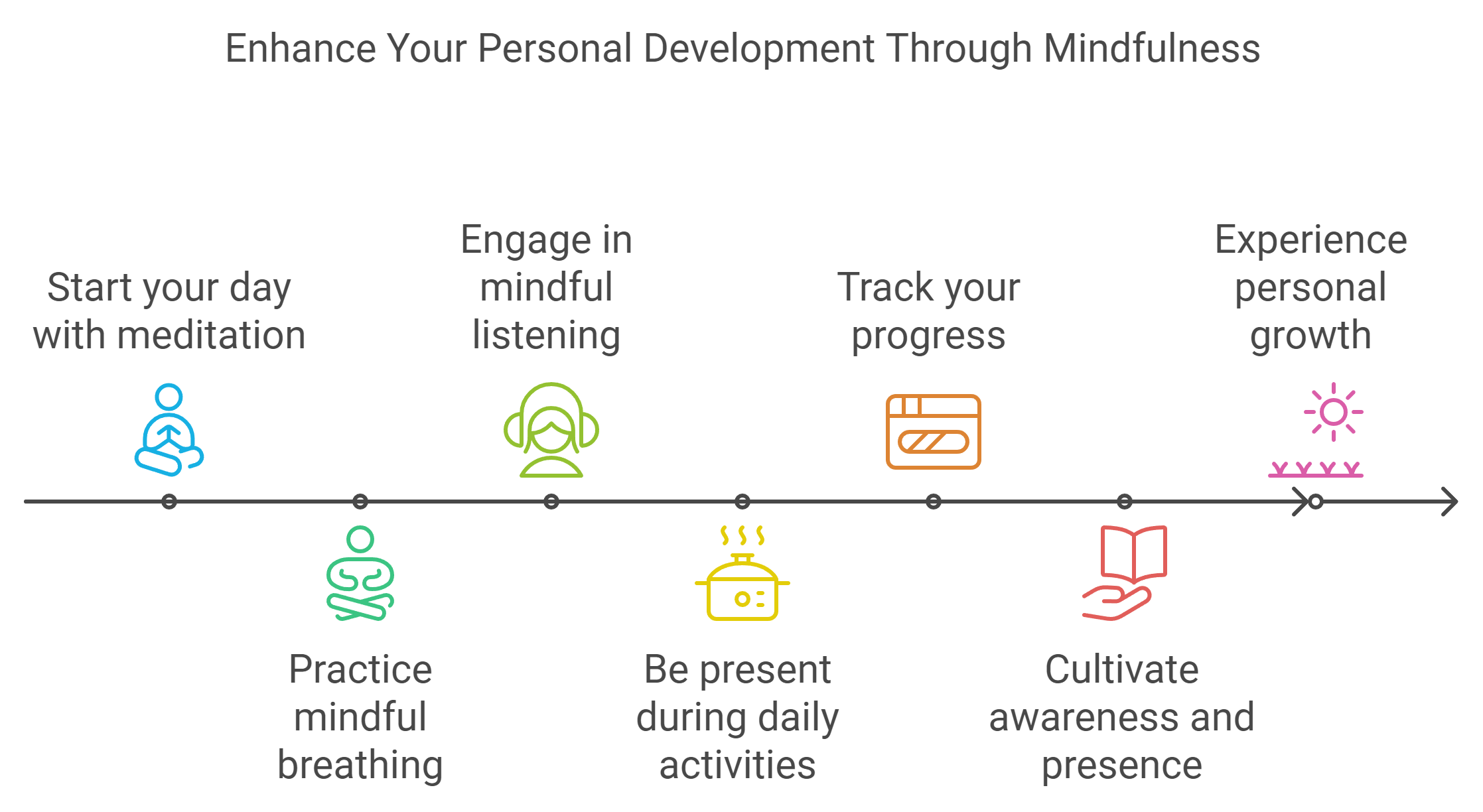
Measuring The Impact Of Mindfulness On Your Personal Growth Journey
Mindfulness can be a transformative practice in one’s personal development journey, particularly when it comes to tracking its impact on mental, emotional, and overall personal growth. Measuring the impact of mindfulness isn’t as straightforward as gauging physical fitness because it primarily involves internal metrics. However, several methods and tools enable individuals to observe their progress effectively.
One valuable approach is to maintain a mindfulness journal. This journal serves as a dedicated space to log daily experiences, thoughts, and emotional states, providing a robust overview of one’s mindfulness journey over time. By regularly noting down these internal experiences, you gather data that can be analyzed to understand patterns and shifts in your cognitive and emotional well-being.
Another effective method involves utilizing mindfulness apps and technologies that offer guided sessions, progress trackers, and personalized insights. These apps can help you log mindfulness sessions and track how your mood, stress levels, and overall sense of well-being evolve. Besides, engaging with such technology can make the practice of mindfulness more structured and consistent.
Feedback from close friends or mentors can also be an invaluable asset in measuring personal growth through mindfulness. Others may notice subtle changes in our behavior, attitude, and emotional responses that we might overlook. Gathering qualitative feedback provides another dimension to understanding the overall impact of mindfulness practices.
In more structured environments, like workplaces, HR departments might use surveys and performance evaluations to measure an employee’s improvements in areas related to mindfulness, such as stress management, focus, and productivity. These quantitative metrics can offer a clearer picture of how mindfulness is influencing one’s professional development.
Self-assessment questionnaires and quizzes specifically designed to measure mindfulness can also be incredibly useful tools. They typically evaluate aspects like attention to the present moment, emotional regulation, and the ability to handle stress—all critical components in personal development.
To comprehend the real impact of mindfulness, it is crucial to combine these tools and methodologies rather than relying on a single measure. This comprehensive approach will provide a multifaceted view of how mindfulness is contributing to your personal growth journey. Ultimately, regular practice of mindfulness, coupled with reflective and external feedback methods, significantly contributes to more balanced and holistic personal development.

Frequently Asked Questions
What is mindfulness?
Mindfulness is the practice of being present and fully engaged with whatever we’re doing at the moment, free from distraction or judgment, and aware of our thoughts and feelings without getting caught up in them.
How does mindfulness contribute to personal development?
Mindfulness contributes to personal development by increasing self-awareness, enhancing emotional regulation, reducing stress, and promoting a greater sense of well-being. These changes create a solid foundation for growth and self-improvement.
Can mindfulness help in achieving personal goals?
Yes, mindfulness can help in achieving personal goals by improving focus, reducing procrastination, and fostering a productive mindset. It allows individuals to approach their goals with clarity and intention, making it easier to stay on track.
What are some practical ways to incorporate mindfulness into daily life?
Practical ways to incorporate mindfulness into daily life include mindful breathing exercises, meditation, mindful eating, and being fully present during everyday activities such as walking or spending time with loved ones.
Is mindfulness effective in managing stress and anxiety?
Yes, mindfulness is highly effective in managing stress and anxiety. It helps individuals to recognize stress triggers, stay calm under pressure, and develop healthier responses to challenging situations.
What role does mindfulness play in improving emotional intelligence?
Mindfulness enhances emotional intelligence by fostering greater self-awareness and empathy. It helps individuals to better understand their own emotions as well as those of others, leading to improved communication and relationships.
Are there any scientific studies supporting the benefits of mindfulness?
Yes, numerous scientific studies have shown that mindfulness practices can lead to significant improvements in mental and physical health, including reduced symptoms of depression and anxiety, enhanced cognitive function, and better overall well-being.

